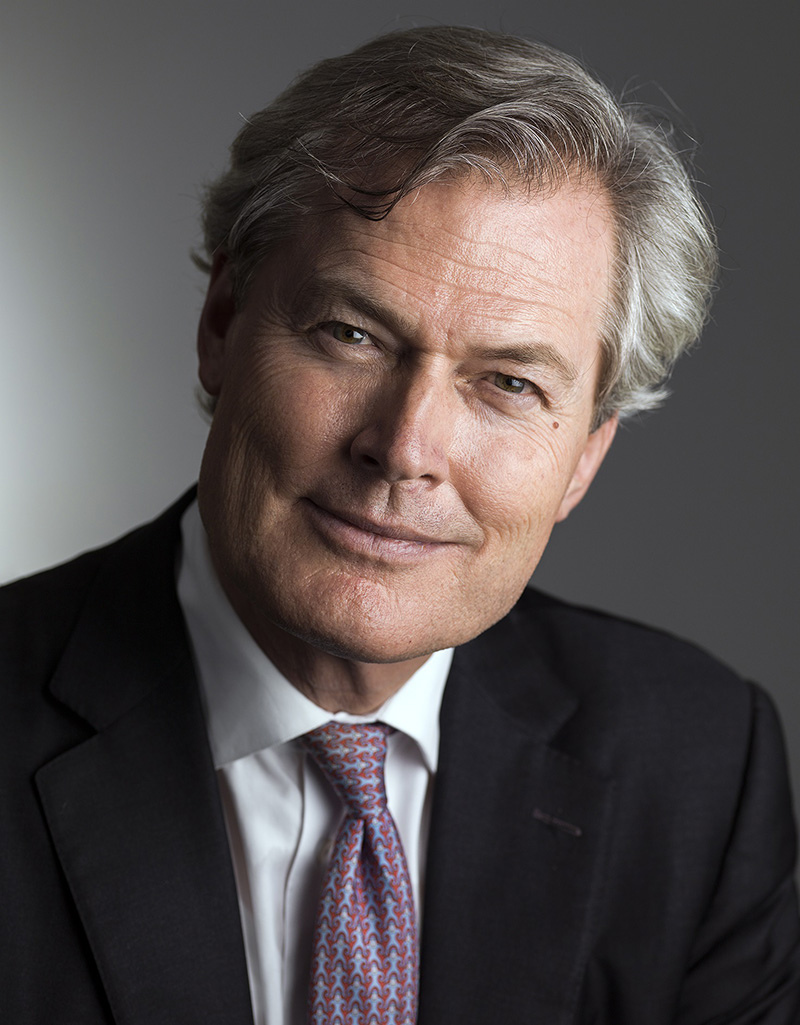
Gunter Pauli (Blue Economy)
“BLUE ECONOMY: HOW TO MAKE LOCAL ECONOMY GROW“
Blue Economy: what comes to your mind the first time you see this expression? You can say an economy related to oceans and that is true…but there is another more visionary model of how the economy should be to be very sustainable: Gunter Pauli’s Blue Economy – taking examples from nature to develop a more sustainable model that boosts local production without further investment of resources on Green Economy. First introduced in 1994, the Blue Economy model now counts over 180 concrete cases. It proves that it is possible to generate more revenue, while generating more jobs and still compete on the global market. Blue Economy takes into account social, economic and environmental factors. What are its basic principles? In whose hands does the responsibility lie for such a change? How is the situation in Italy? How to educate children and the young generation? Gunter Pauly, Economist, initiator of the Blue Economy, answered to these and other questions.
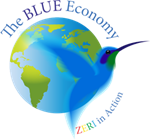
For further details –
https://www.gunterpauli.com/
INTERVIEW – (July 2018)
This interview was made and published in July 2018 on www.lteconomy.org
Subject: Blue Economy and local development
By Dario Ruggiero, Founder of Long Term Economy
Highlights
- Any model where the rich get richer and the poor are poorer and where 10 people have as much wealth as 3 billion people on earth cannot be the model of the future… Sorry, we have to change the business model.
- What I propose and put in practice is simple: use what you have, do not expect the earth to produce more – do more with what the earth produces, generate value, and respond to people’s needs. It is so basic and simple that sometimes it is difficult to understand.
- The main driver is demand… So let us start with the basic needs like water, food, health, housing, energy to start with. If you provide this locally then you will have kickstarted the multiplier effect.
- In Italy of course you have the greatest case: Novamont. How to convert waste from sugar beets into alcohol which is a building block of bioplastics.
- Big corporations will always be around. But as a few companies merge and acquire many others each market will be dominated by 2-3 major players and that leaves a lot of room for many of the small ones to emerge and transform the market.
- So the key is to inspire the children never to stop dreaming, but ground their grand ideas into a vision… I have now 180 fables published … and there are another 185 coming over the next 3-4 years.
- ZERI is a network. Whenever there are projects that make sense and that have a solid support and is carried by enthused teams then we structure this into a legal entity!
- My suggestion to the next generation is simple: imagine and put in place what your parents never imagined … and make certain that there is a connection to the heart and the soul… So parents need to read a story for the children EVERY DAY for the rest of their life. If you are not inspiring kids … what are you doing?
⇓
“What I propose and put in practice is simple:
do not expect the earth to produce more – do more with what the earth produces, generate value, responds to people’s needs.”
Question 1 | Blue Economy basic principles
I have been very frustrated with the Green Economy (GE) I supported for 30 years. After 3 decades we have to realize that whatever is good for you and good for the environment is expensive. So the GE is for the rich? That cannot be the model we wanted. Industrial symbiosis introduced already 3 decades ago by the Kalundborg example in Denmark was a breakthrough, and now we see it come back with a new name: circular economy. That is good but it continues with exactly the same business model: economies of scale, always aiming to produce more and cheaper. That cannot be the model of the future, one where the rich get richer and the poor are poorer and where 10 people have as much wealth as 3 billion people on earth? Sorry, we have to change the business model.
What I propose and put in practice is simple: use what you have, do not expect the earth to produce more – do more with what the earth produces, generate value, responds to people’s needs. It is so basic and simple that sometimes it is difficult to understand. We are used to complex economic models that no one really understands what it does
.
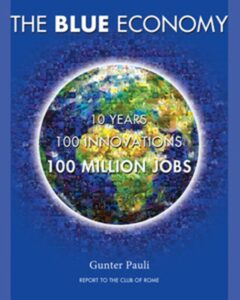
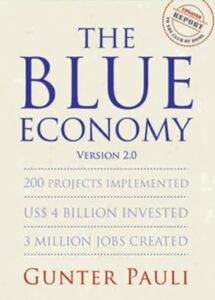
⇓
Question 2 | Blue Economy main drivers
So “a shift towards local production”…. Based on your experience, what are the main drivers to boost local production? In whose hands does the responsibility lie for such a change (Institutions, Education, Firms, New Generations, Consumers etc…) and how long can this changing-process last?
The main driver is demand. That is where economy starts from: what do people need? So let us start with the basic needs like water, food, health, housing, energy to start with. If you provide this locally then you will have kickstarted the multiplier effect: i.e. whatever is produced locally is consumed locally and that grows the local economy – even if it is more expensive on a sale of the day, it brings more wealth to the region since the money circulated locally. The hairdresser pays the shop for the beauty products, the shop owner goes to the local restaurant, the cook buys local veggies … that is 4x the same cash flowing thru local hands. This is how you grow the economy and the shift can go as fast as local supply emerges.
⇓
Question 3 | Blue Economy projects
A cup of coffee – well you only ingest 0.2% of the biomass. 99.8% is wasted. This is a great substrate for mushrooms, and after harvesting 5 kg mushrooms on 10 kg coffee the leftovers are great feed for chickens. These are 3x production instead of 1x! Use what you have. In Italy of course you have the greatest case: Novamont. How to convert waste from sugar beets which have hardly any market left into alcohol which is a building block of bioplastics.
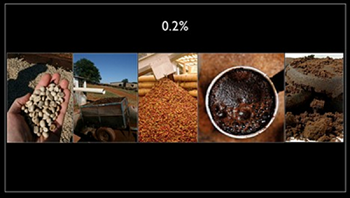
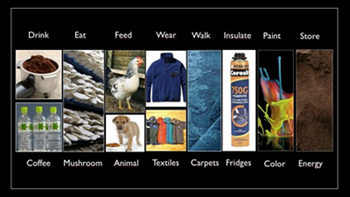
“As a few companies merge and acquire many others each market will be dominated by 2-3 major players
and that leaves a lot of room for many of the small ones to emerge and transform the market”
Question 4 | The role of big corporation
Big corporations will always be around. But as a few companies merge and acquire many others each market will be dominated by 2-3 major players and that leaves a lot of room for many of the small ones to emerge and transform the market. These are the wonderful opportunities we see emerge now.
⇓
Question 5 | Fables…
The parents think that their children live in a world of fantasy with imaginary characters. Actually, it are the parents who live in a world that does exist: we consume more than there is and exhaust the world, fill it with rubbish and contaminate the seas with plastics that will never degrade. So the key is to inspire the children never to stop dreaming, but ground their grand ideas into a vision, using science and empowering them to make the changes, the fundamental shifts their parents could never even imagine. I have now 180 fables published … and there are another 185 coming over the next 3-4 years.
⇓
Question 6 | The Global ZERI Network foundation
ZERI is a network. Whenever there are projects that make sense and that have a solid support and is carried by enthused teams then we structure this into a legal entity. There are 38 around the world. There are 1,000 of people who would like to set up initiatives, but only less than 1% actually makes it. The proposals we make are so “different” that one needs to be very determined clear minded in order to pursue this over 5-10 sometimes 25 years. That is exceptional but these people we support and are proud to be associated with.
⇓
Question 7 | Blue Economy in the world
You have collaborated with many countries in private and public projects (Italy, China, Japan, Belgium etc…). What countries around the world are more in favour of the Blue Economy?
There is no country in favor. Even though there are now countries that have a minister for the Blue Economy (BE) like the Seychelles and Sao Tome e Principe. We do not necessarily need countries to support the BE, we need communities, regions to see the benefits it can bring to better respond to the needs of people and the capacity to have a stronger resilience. There is no doubt, we need to be capable of facing tough times … which will certainly come.
⇓
Question 8 | Blue economy and oil companies
You are also helping Oil companies in Europe get rid of their stranded assets. Can you tell us more about that?
“Imagine and put in place what your parents never imagined…”
Question 9 | The society and the young in the 21st century
How do you think will society be shaped in the 21st century (in terms of Jobs, equality, welfare etc…)? What do you suggest young generations should do in order to better face their future?
My suggestion to the next generation is simple: imagine and put in place what your parents never imagined … and make certain that there is a connection to the heart and the soul way beyond the technologies and digital communications. So therefore parents need to read a story for the children EVERY DAY for the rest of their life. If you are not inspiring kids … what are you doing.
